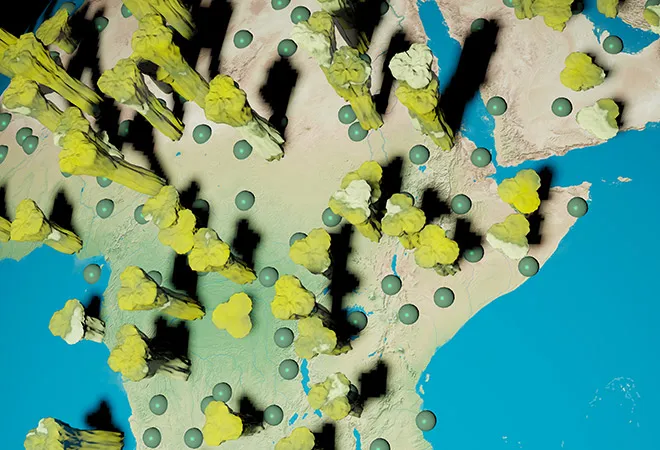-
CENTRES
Progammes & Centres
Location

Covid-19 has spread across the World and the African continent is no exception.
The countries have adopted varied strategies in response to the pandemic. Kenya reported its first case on 13 March, which was was also the first case in East Africa. Since then, other East African states (Uganda, Tanzania, Rwanda and Burundi) have all reported positive cases.
Soon after first case was reported, the Kenyan government announced the closure of all schools, encouraged people to work from home and banned public gatherings. Less than two weeks later, a dusk-to-dawn curfew was enforced across the country. As the number of cases continued to rise, the government imposed a ban on movement in and out of the counties with the highest number of cases—Nairobi, Kwale, Mombasa and Kilifi, with Mandera being added to the list later.
The Kenyan government announced a 100 percent tax relief for those with an income of Ksh 24000 (about US$225) and below, and reductions on income tax and VAT. The ‘Inua Jamii’ cash transfer programme was used to provide money to 1.1 million people (mainly the elderly and those living with disabilities).
Restaurants, bars and places of worship were initially closed, but in recent weeks restaurants have been allowed to reopen till 4pm, provided government guidelines were followed. on 16 May, most these measures were extended for another 21 days. And as of 20 May, Kenya had over 1000 cases.
Although such measures are to be applauded, they are not without challenges. Questions over how social distancing measures can be followed in crowded informal settlements remain, as have questions over hygiene (washing hands) when there is no access to water.
More horrifying still, Human Rights Watch reported that at least six people were killed during the first ten days of the curfew as a result of police brutality. One of the most heart breaking cases was that of 13-year-old Yasin Moyo, who was shot dead while playing on the balcony of his home.
Demolitions in informal settlements over the last few weeks have also left thousands homeless during the pandemic. This has fuelled the long history of mistrust in security forces and the government. Early on, people arriving in Nairobi were told to isolate in government facilities but at their own cost. The result was hefty bills, with many complaining that they were forced to remain in mandatory quarantine for longer than 14 days and that conditions were well below par. While the government has since announced that it will manage costs of those that are quarantined, many Kenyans are afraid to come forward to be tested over concerns that they will be forced to pay if their tests are positive.
Meanwhile the continuing ‘political theatre’ in the country around reported conflicts between the president and his deputy, plus a locust invasion and flooding, has left a bad taste for most Kenyans.
The number of cases in Uganda are relatively low, and its management of previous epidemics such as Ebola and the Marburg virus have stood it in good stead when it came to preparing for Covid-19. In particular, the ongoing Ebola outbreak in the Democratic Republic of Congo meant that measures controlling movement in the region were already in place.
Prior to the first case being reported, the Uganda Virus Research Institute was equipped quickly to be able to run tests. The country banned gatherings, closed schools, and intensified screening at points of entry early on. Even before a positive case had been reported, Uganda quarantined 100 travellers from China upon their arrival.
Ugandan President Yoweri Museveni announced a countrywide lockdown at the end of March when the country had only 13 cases. The country is still in lockdown.
During his update on 18 May (at which time Uganda had 227 cases), Museveni said all Ugandans above the age of six would receive one free mask, following which public transport services would be allowed to resume.
Museveni’s regular addresses, his usage of Biblical language and at times lengthy explanations have certainly been a talking point. He also released a video showing Ugandans how to exercise at home, and most recently how to consume food ‘optimally’.
Uganda has also seen security forces use a disproportionate amount of force in implementing measures. Several journalists were assaulted, activists holding protests over the ‘hunger pandemic’ were arrested, and there have been accusations of several people, including pregnant women, being shot at.
While the government has announced it will distribute food to vulnerable people, it also said that no private individuals were allowed to do this. Opposition parliamentarian Francis Zaake was arrested and reportedly tortured for distributing food to his constituents.
According to the Ugandan health ministry, many of the country’s recent cases have been truck drivers who were tested at the border, many arriving from Tanzania.
The country has raised some eyebrows over its approach to the pandemic. At the time of writing, Tanzania has not released any information on Covid-19 figures since 29 April, even as other countries have provided daily updates.
The health minister has said that data has not been released because technical upgrades were underway at the National Laboratory.
Tanzania registered its first case in March, and closed schools and universities and suspended sporting events soon after. President John Magufuli urged people to continue going to church “as that is where healing is.” This came as a surprise to many considering the global examples of the spread of infection being linked to places of worship.
In mid-April, Magufuli called for three days of prayer against the virus. Two weeks later he stated that a papaya and a goat had tested positive for the virus, suggesting that there was something wrong with the test kits.
Magufuli has also continued to insist that there were no plans to lockdown Dar es Salaam due to the economic impact it would have.
Opposition leaders and activists have accused the government of covering up results and conducting secret late night burials, and have said the recent deaths of three members of parliament was due to the virus. The US Embassy in Tanzania recently said that hospitals in Dar es Salaam have been “overwhelmed” and the chance of contracting the virus is “extremely high.”
Speaking at a church on 17 May, Magufuli said the number of cases in the country were on a decline and that if the trend continued, colleges would reopen. He also announced that those arriving in Tanzania would no longer be quarantined (but would go through enhanced screening at airports) and that God had heard the country’s prayers.
While Magufuli’s faith may be high, that of his neighbouring countries are not.
Zambia temporarily closed its border with Tanzania following a spike in cases at the border town of Nakonde, and Kenya has followed suit in recent days.
Uganda has announced that all truck drivers (many of whom come from Tanzania) will be tested at the border and not allowed to enter until their results are received.
Tanzania’s approach has not only led to the potential risk of the virus spreading further, but also creates mistrust in the Magufuli government and it’s seeming lack of transparency, or with people taking the virus lightly and dismissing its seriousness.
Burundi also has a questionable approach to the virus.
The country It was business as usual before that, with campaign rallies continuing as normal.
On 13 May, the country declared the WHO representative and three senior health experts as persona non grata and ordered their expulsion.
During the campaign period, the ruling party candidate urged people to continue as normal, saying that “God loves Burundi.”
Things are quite different in Rwanda, where a lockdown was imposed on 21 March when the country had 17 cases. Borders were closed (except for cargo), and travel between cities was prohibited.
On 1 May, Rwanda relaxed some measures as the count was at 243 cases. Then on 17 May, with the number of cases at 267, the government announced revised curfew timings (9 pm to 5 am), and that civil weddings with 15 or fewer guests would be permitted again and motorcycle taxis would resume services from 1 June.
Lockdown measures across East Africa have, as expected, have hit the most vulnerable people, leaving them with a choice between dying from hunger or dying from Covid-19 (and, in some cases, from police violence.)
While the decisions made by the governments of Tanzania and Burundi remain questionable, Uganda, Rwanda and Kenya acted swiftly in putting measures in place, and this may well prove to be the big differentiator.
Equally important is the work of activists across the region who continue to demand accountability and push against the usage of Covid-19 measures by authorities to diminish rights and freedoms.
Meanwhile, one waits to see what impact Tanzania’s actions will have on regional relationships.
The views expressed above belong to the author(s). ORF research and analyses now available on Telegram! Click here to access our curated content — blogs, longforms and interviews.

Samira Sawlani is a journalist writer and analyst with a focus on East Africa.A holder of an MA in International Studies and Diplomacy from the ...
Read More +